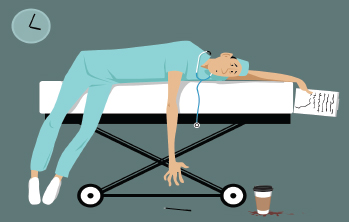Some residency programs allow their physicians to take call at home. Others have their residents take call in house, staying overnight in the hospital. There is some concern that working in the hospital puts an extra burden on the residents that may add to burnout or mistakes from loss of sleep. Others worry that being at home may result in missing surgical cases they would participate in if they were already at the hospital.
Explore This Issue
February 2020“The concern with call is that it is disruptive to sleep,” said Stacey Gray, MD, vice chair of education for the otolaryngology department at Harvard Medical School. “If residents are on call and extremely busy, they might not get enough sleep and rest to be truly productive the following day.”
Call Can Disrupt Sleep
Research tends to support those concerns. Andrew M. Nida, MD, and colleagues from the University of Mississippi School of Medicine in Jackson undertook a web-based survey of otolaryngology residents at their institutions. Results revealed a mean Epworth Sleep Scale (ESS) score of 9.9 ± 5.1, indicating that a significant number of residents were excessively sleepy (Am J Otolaryngol. 2016;37:210-216).
But does taking call from home make any difference? The Mississippi group indicates that the answer may be yes. They noted that residents taking in-hospital call had statistically significant fewer hours of sleep when compared with those taking call at home. And the amount of sleep residents get can directly impact the safety of these physicians, according to this survey. Residents who reported no needle stick injuries and no near-miss motor vehicle accidents also had more sleep as measured by significantly lower mean ESS scores.

© Aleutie / shutterstock.com
While the place of call is important, another noteworthy consideration is the volume of calls and their timing. Research reported in the Journal of Graduate Medical Education showed that urology residents slept an average of 408 minutes per night, as measured by a Fitbit device, when off call. On in-home call, the average fell to 368 minutes per night for those who were not fatigued the next day and 181 per night when on call and self-reporting fatigue. Each page was associated with 4.71 minutes less sleep (J Grad Med Educ. 2018;10:591-595).
At-Home Call Different?
The rise of in-home call can be partly attributed to resident work-time requirements from the Accreditation Council for Graduate Medical Education (ACGME). Restricting the number of hours a resident can work is related to concerns about sleep deprivation resulting in medical mistakes. Because of this requirement, if a program uses in-hospital call, the resident has to be given the following day off.
The ACGME doesn’t require residents taking call from home to take off work the next day. Dr. Gray thinks that requiring a post-call day off is another driver of at-home vs.in-hospital call. Their program was concerned about a training impact because the residents missed educational opportunities while on their mandated time off.